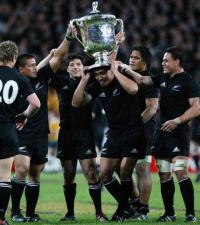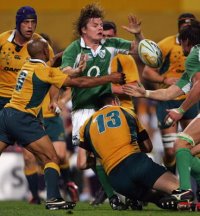Narrow win in Brisbane seals trophy
New Zealand sealed the Bledisloe Cup and laid one hand on the 2006 Tri-Nations trophy with a narrow 13-9 win over Australia in Brisbane on Saturday.

Joe Rokocoko's try in the first half was the difference between the two teams, and although Australia had the better of the possession and territory they could not find the key to unlock some magnificent All Black defence.
The one-try thriller was a thoroughly absorbing contest between two skilled and determined sides. In the end there was a try's worth of difference. The hour and a half simply flew away.
New Zealand had much the better of the scrums, shoving ahead on their own ball and making a mess of a few Wallaby scrums. The Wallabies had much the better of the line-outs, taking six throws off the All Blacks who also threw in skew once. The line-outs were more important in terms of getting possession as there were 37 of them, but the damage to the scrums -- there were only 17 of them -- did more damage to morale. The penalty count was 7-6 to Australia in the first half and 10-9 over all, but where the All Blacks probably profited most was at the vital post-tackle turn-overs.
There were differences in playing styles. The Wallabies went on one-man charges and used the boot a lot while the All Blacks looked for chances to pass and run, even from within their own territory.
Both sides tackled with deadly efficiency and it was a late tackle which saved the game for the All Blacks. Going right, Stirling Mortlock produced the most incisive break of the match. Mark Gerrard was free on the outside and raced for the line. He started to come back inside as Richie McCaw charged across in desperation. It was similar to the earlier Rokocoko-on-Latham situation in Bledisloe one, but McCaw got his man and then he got to his feet and got the vital ball. It was a moment of brilliance by one of the world's greatest forwards.
After all the polemic about the throat-cutting haka, the All Blacks did not do it. They went back to a "Ka Mate" with grimaces. Then came Waltzing Matilda during which the Wallabies did their own dance -- playing defence against tackle-shields while the All Blacks stood and watched in deflated amazement. One-upmanship became two-upmanship!
The first half flew by. The Wallabies had more possession and bashed and kicked but it was against an adamantine defence which allowed them not a chink of a gap. The Wallabies did not look like scoring a try, not even when they marched a post-line-out maul some 18 metres to about five metres from the new Zealand line by which time George Smith, the ball-carrier, had got ahead and the All Blacks, with Chris Jack powerful, won a turn-over.
The All Blacks had two chances to score tries, and they took the first one brilliantly.
They were going left in close formation. Right against the touch-line, Joe Rokocoko got a tiny pass from Jerry Collins which he had to pull back from behind and then he accelerated. He went past Rocky Elsom on the outside, away from Matt Giteau and then inside Chris Latham for a magnificent try.
On the other occasion the All Blacks went left with lots of flicked passes -- Carter inside to Gear, Gear back to Carter, Carter to Mauger, Mauger inside to Kelleher, Kelleher to Mils Muliaina and suddenly the All Black had space but the intense Wallaby defence scampered across and put Leon MacDonald down.
The Wallabies started the scoring when Keven Mealamu suffered a dubious penalty for coming in the side of a maul when he gave every impression of coming in from behind. Mortlock goaled that after 8 minutes.
Straightaway the All Blacks struck with Rokocoko's try which Carter, from the left corner on his left foot, bisected the uprights with the conversion. That made it 7-3 after ten minutes.
When Latham kicked the ball out for a line-out five metres from the All Black line, McCaw jumped at number two and won the ball. Kelleher cleared.
When MacDonald broke and set Carter running away from Mortlock from within the New Zealand 22 a try was possible.
When Rocky Elsom was penalised for illegally using his hands at a tackle, Carter made it 10-3. This was followed by a period of frantic Wallaby attack. There was no doubting their intent, but the attacking was one-at-a-time and the resilient All Blacks resisted.
Just before half-time Mealamu was penalised for diving in and Mortlock made the score at the break 10-6.
The New Zealanders stared the second half destroying two Wallaby scrums. The Wallabies had the first real chance to score but McCaw thwarted that with that magical turnover. Soon afterwards they had a second chance on the other wing when they countered and gave Lote Tuqiri a chance to run but this time it was Ali Williams who was there to tackle and win the vital turn-over.
The All Blacks had an attacking moment and a drop goal by Carter made it 13-6 to the All Blacks.
Soon afterwards Williams was penalised at a tackle/ruck and Mortlock made it 13-9.
That was the final score but it tells little of the massive, valiant efforts of both sides.
Just before the end the Wallabies won a rare turn-over at a tackle but Latham kicked it into the All Blacks' in-goal where Carter was on hand to ground the ball.
When the siren went the Wallabies had the ball and they went through phase after phase, but slightly in their own half and without getting beyond the gain-line until the game died on an unplayable tackle.
Man of the Match: There were lots of heroes out there, especially Stirling Mortlock and George Smith for Australia and our Man of the Match -- leader and saviour, Richie McCaw.
Moment of the Match: It's a toss up between Joe Rokocoko's try and Richie McCaw's try-saving action. Let's give it to the try.
Villain of the Match: There were tiny emotional moments but Jerry Collins may well have attracted the citing commissioner's interest as he tugged, and kept tugging at, George Smith's long locks.
The scorers:
For Australia:
Pens: Mortlock 3
For New Zealand:
Try: Rokocoko
Con: Carter
Pen: Carter
Drop goal: Carter
Australia: 15 Chris Latham, 14 Mark Gerrard, 13 Stirling Mortlock (vice-captain), 12 Matt Giteau, 11 Lote Tuqiri, 10 Stephen Larkham, 9 George Gregan (captain), 8 Scott Fava, 7 George Smith, 6 Rocky Elsom, 5 Dan Vickerman (vice-captain), 4 Nathan Sharpe, 3 Rodney Blake, 2 Jeremy Paul, 1 Greg Holmes.
Replacements: 16 Tai McIsaac, 17 Guy Shepherdson, 18 Mark Chisholm, 19 Wycliff Palu, 20 Sam Cordingley, 21 Mat Rogers, 22 Clyde Rathbone.
New Zealand: 15 Leon MacDonald, 14 Rico Gear, 13 Mils Muliaina, 12 Aaron Mauger, 11 Joe Rokocoko, 10 Dan Carter, 9 Byron Kelleher, 8 Rodney So'oialo, 7 Richie McCaw (captain), 6 Jerry Collins, 5 Ali Williams, 4 Chris Jack, 3 Carl Hayman, 2 Keven Mealamu, 1 Tony Woodcock.
Replacements: 16 Andrew Hore, 17 Greg Somerville, 18 Jason Eaton, 19 Chris Masoe, 20 Jimmy Cowan, 21 Luke McAlister, 22 Isaia Toeava.
Referee: Alain Rolland (Ireland)
Touch judges: Joël Jutge (France), Marius Jonker (South Africa)
Television match official: Willie Roos (South Africa)
Assessor: Dick Byres (Australia)







